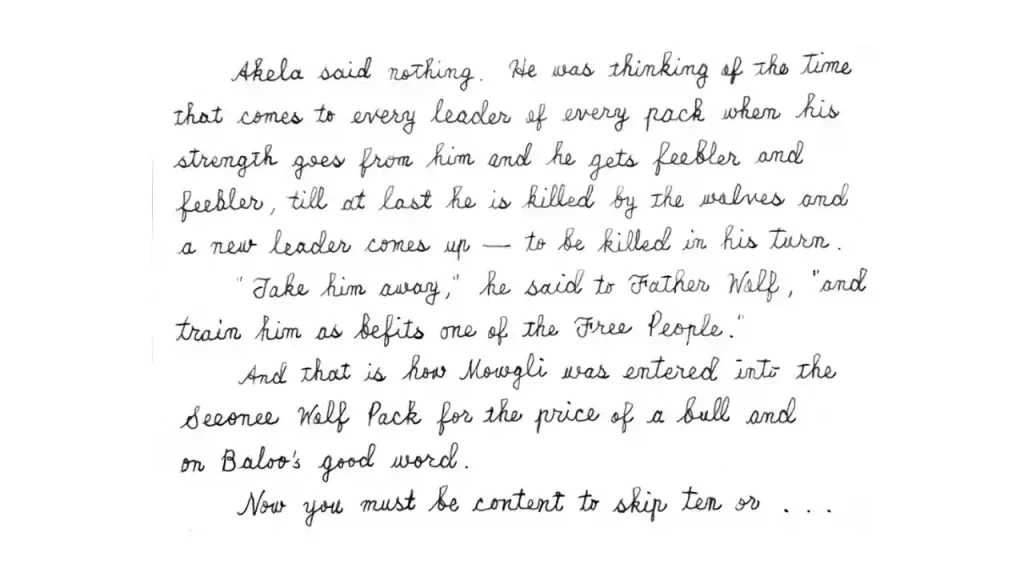Akela said nothing. He was thinking of the time that comes to every leader of every pack when his strength goes from him and he gets feebler and feebler, till at last he is killed by the wolves and a new leader comes up—to be killed in his turn.
The Jungle Book
- Japanese grammar
- modifier: つよさが・おとろえると
- subject: リーダー
- modifier: こうたいする
日本語訳:
アキーラは何も言いませんでした。
彼は群れのリーダーが殺される時のことを考えていました。
強さが衰えて、次第に弱っていき、ついにはオオカミたちに狩られて、そして新たなリーダーが誕生する。あらゆる群れのあらゆるリーダーへ訪れる、その時のことを。
- Kanji
- 衰える / Otooreru (おとろえる, Decline, Deteriorate)
- 次第に / Shidai ni (しだいに, Gradually, Progressively)
- 交代する / Kōtai suru (こうたいする, Replace, Alternate)
“Take him away,” he said to Father Wolf, “and train him as befits one of the Free People.”
「彼を連れていけ」アキーラが父オオカミに言いました。
「そして、フリーピープルの一員に相応しく、彼を教育しろ」
And that is how Mowgli was entered into the Seeonee Wolf Pack for the price of a bull and on Baloo’s good word.
- subject: モウグリ
- predicate: さんかする
- modifier: むれに
そのようにして、モウグリはシーオニーのオオカミの群れに参加しました。一頭の雄牛の代償と、バルーの弁護によって。
Now you must be content to skip ten or eleven whole years, and only guess at all the wonderful life that Mowgli led among the wolves, because if it were written out it would fill ever so many books.
さて、あなたは丸10~11年を飛ばして、オオカミたちの中でモウグリがおくった不思議な生活を推測するだけで満足すべきです。
もしもそれを余さず書いたら、たくさんの本が必要なので。
He grew up with the cubs, though they, of course, were grown wolves almost before he was a child.
彼はオオカミの子供たちと一緒に成長しました。もちろん、彼が子供になる前に、オオカミの子供たちは成獣になりました。
And Father Wolf taught him his business, and the meaning of things in the jungle, till every rustle in the grass, every breath of the warm night air, every note of the owls above his head, every scratch of a bat’s claws as it roosted for a while in a tree, and every splash of every little fish jumping in a pool meant just as much to him as the work of his office means to a business man.
- subject: ちちオオカミ
- predicate: おしえる
- modifier: モウグリに
父オオカミはモウグリに自分の仕事と、ジャングルでのあらゆる物事の意味を教えました。草地での物音、夜の気配、頭上にいるフクロウの声、木にとまったコウモリが出す音、水たまりで跳ねる小魚の水しぶき、それらはモウグリにとって重要な意味を持っていました。
- 物音 / monooto (ものおと, sound, noise)
- 気配 / kehai (けはい, sign, indication, presence)
When he was not learning he sat out in the sun and slept, and ate and went to sleep again.
学ばない時は、モウグリは日向に出て昼寝をして、食べて、そしてまた眠りに行きました。
- 日向 / hinata (ひなた, sunny place, in the sun)
- 昼寝 / hirune (ひるね, nap, afternoon sleep)
When he felt dirty or hot he swam in the forest pools; and when he wanted honey (Baloo told him that honey and nuts were just as pleasant to eat as raw meat) he climbed up for it, and that Bagheera showed him how to do.
汚れや暑さを感じた時は、モウグリは森のプールで泳ぎました。
ハチミツが欲しい時は、(ハチミツやナッツが生肉と同じくらい美味しいと、バルーが彼に教えました)モウグリはそれを取りに木登りしました。バギーラがそのやり方を彼に教えました。
- 美味しい / oishii (おいしい, delicious, tasty)
- 木登り / kinobori (きのぼり, tree climbing)
Reference : The Jungle Book by Rudyard Kipling (project gutenberg)
English Story With Easy Japanese Translation
